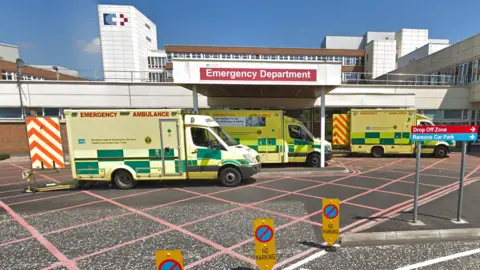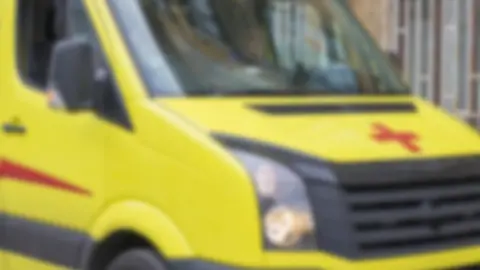A&E waiting times: 'Distressing' 10-hour wait outside for dementia patient
 Getty Images
Getty ImagesThe families of two women who waited outside NI hospitals in ambulances all night before being admitted have spoken about the distress it caused.
Colleen O'Neill's grandmother Mary, who has dementia, waited more than 10 hours outside Causeway Hospital in Coleraine.
Tracey McCausland's mother Patricia was outside Antrim Area Hospital with a fractured kneecap for eight hours.
It comes as attempts are being made to prevent older people being kept in ambulances for long periods of time.
Health trusts in Northern Ireland have been advised to create areas within their emergency departments for older people who are brought by ambulance.
On Monday, a 77-year-old woman died on a trolley waiting to be admitted to the Royal Victoria Hospital in Belfast.
BBC News NI understands these newly created areas are not hospital wards as there are none available.
Instead, the areas could be a corridor which is cordoned off especially for older patients.
Since Friday, there have been reports of many elderly frail patients having to be kept in ambulances or on trolleys in corridors as there is no room for them within the emergency area.
Mary's story
Colleen O'Neill's grandmother Mary is 80 and has dementia.
She was taken into hospital on Tuesday with a suspected stroke after seeing the on-call doctor.
"She was taken in at 1.30 to Causeway where she was left in the back of an ambulance until 11.40 - for more than 10 hours," she told Good Morning Ulster.
She said her grandmother was "very agitated and confused".
"They sent her home after doing nothing medically for her," she added.
Ms O'Neill said she was angry with those in positions of power in Northern Ireland.
"The staff are doing everything they can to keep this country going but it's a disaster," she said.
"Thankfully we have a good homecare plan set in place and the care workers are fantastic.
"They are outstanding and do anything possible for my grandmother and she is comfortable but we dread her going into hospital."
Patricia's story
After her eight-hour wait outside in an ambulance, Tracey McCausland's mother Patricia was admitted to hospital on Thursday morning.
When she was "eventually" allowed in to see her on Friday afternoon, she had not had her underwear changed, been washed or had her teeth cleaned.
Ms McCausland said the situation was "in no way a reflection on the staff".
"They are incredibly in a horrific situation and they are at their limit," she told Good Morning Ulster.
"She was transferred to Musgrave on Monday evening which was the first night's sleep she had since it happened."
There is now the issue of where she will go for rehab, her daughter told the programme.
 Google Maps
Google MapsDr Gareth Hampton, the clinical director of emergency medicine at the Southern Health and Social Care Trust, said his hospital was overwhelmed and "every cubicle was filled and every corridor filled".
"In the last 24 hours, we have had more patients arriving.
"We have 28 adult assessment cubical assessments in Craigavon and with the 138 patients in the department it is way beyond what we have capacity for."
'How do you pick?'
He said he and his staff loved their job and it was upsetting for them.
"You many have one cubicle and dozens of patients we need to be in it - how do you pick? Do you pick the poor lady with the broken hip in the ambulance outside?
"Do you pick the person in the waiting room with chest pain who is scared and could have a heart attack?
"Some of our patients have had a heart attack in waiting room."
He said that it is not uncommon for a patient to wait 12 hours to be seen.
"That is way beyond the standard of care we set ourselves. It is distressing for patients and staff," he added
"There has been a slow escalation of what has been happening - we have been predicting this is going to come and winter will be difficult."
He said the situation was "deeply frustrating".
"It chips away at you over time. My staff want to have some hope and optimism."
'Demoralised'
The situation in Northern Ireland's hospitals is "just not tolerable", according to Sinn Féin vice-president Michelle O'Neill.
After a meeting the Royal College of Nursing (RCN), she said nursing staff were feeling "undervalued, exhausted and demoralised".
She added: "They need some hope that we can work with all the parties so that we can prioritise a budget for health, some hope that we can put proper strategies in place."
Earlier DUP leader Sir Jeffrey Donaldson told the BBC's Today programme that his party had "argued for some time that reform of the health service is needed".
"We want to see a solution on the protocol, and let's not forget that the protocol itself impacts on every aspect of life in Northern Ireland including in the delivery of healthcare," he said.
"Cross-community consensus is the basis of power-sharing, but unfortunately the protocol has broken that."
 Getty/Anastasiia Kuznetcova
Getty/Anastasiia KuznetcovaLast week there was a so-called emergency summit held last Wednesday.
It was led by a group of health officials known as the Strategic Planning and Performance Group who were formerly part of the health and social care board which has now closed.
In a letter seen by the BBC from the group's lead, civil servant Sharon Gallagher, to GPs, hospitals and health trust chief executives, Ms Gallagher said that a number of "additional interventions emerged strongly which if implemented quick;y could yield further gains".
Two initiatives were discussed as part of the summit which health officials believe could have a significant impact in the care of elderly patients.
They were cohorting patients who arrive by ambulance in emergency departments to release ambulance crews and transferring patients with a decision to admit to wards in advance of a bed being made available, as opposed to waiting in the emergency department for that bed.
'Balancing the risks'
Ms Gallagher said that she "recognised the challenge this presents but it needs to be seen in the context of balancing the risks across the entire system that was discussed at the summit".
The summit also discussed the need to prevent care home residents being transferred to an acute hospital environment "when that is not the best place to meet their needs".
The steering group said that there are "many examples of good practice which seeks to prevent the unnecessary conveyancing of frail elderly patients".
Health trusts and primary care practitioners were asked to "expedite discussions" to ensure a more proactive approach to care is introduced across all geographical areas as soon as possible.
